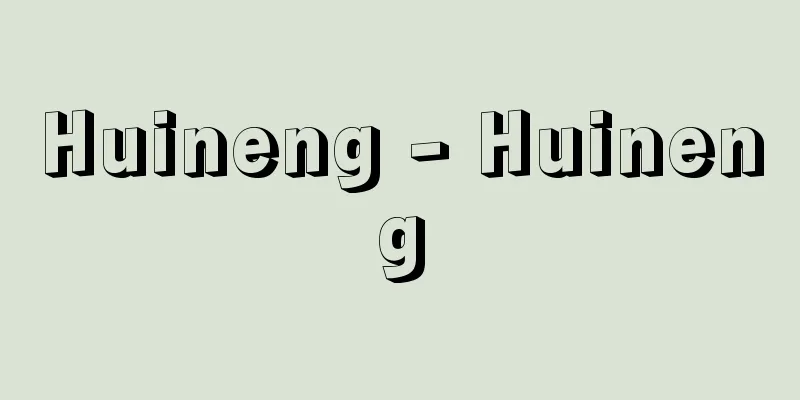Huineng - Huineng

|
A monk from the Tang Dynasty in China. The sixth patriarch of Chinese Zen Buddhism. His common surname was Lu. His posthumous name was Daikan Shinku Fukaku Enmyo Zen Master. He is also known as the Sixth Patriarch. Born in Xinzhou (Guangdong Province), he lost his father at the age of three and supported his mother by selling firewood in the city. One day, he heard a guest reciting the Diamond Sutra and decided to become a monk. He went to Dongshan in Huangmei, Qizhou (Hubei Province) to visit the fifth patriarch of Zen Buddhism, Hongren, and was allowed to enter the temple after a dialogue about Buddha nature. After living in a rice mill for eight months, he received the teachings of the Great Dharma from Hongin and returned to the south to hide in a hunter's house. In 676 (Gihou 1), he met the monk Inshu (627-713) at the Nankai Hosho-ji Temple to lecture on the Nirvana Sutra, where he was recognized by Inshu after a dialogue and received the shaving of his head and the initiation of the monk. In the following year, 677, he lived at the Baolin Temple in Caoxi, Shaozhou (Guangdong Province), where he promoted Zen Buddhism and gained many followers. In 705 (Shenlong 1), despite an invitation from Chūō, he did not attend due to illness, and passed away in Xinzhou on August 3, 2nd year of the Ten-ten era. He produced a collection of sermons titled the Sixth Patriarch's Platform Sutra, and his Zen method was called Nanton (Southern Zen of Sudden Enlightenment) and was praised as being on par with Shenshu's Northern Gradual Enlightenment (Northern Zen). His disciples included Nanyue Huairan, Seigen Gyoshi, Nanyo Echu (?-775), Sikong Benjing (667-761), and Kataku Jinne, and all of the later Five Houses and Seven Schools developed from this school. [Yoshiaki Tanaka January 19, 2017] "Komazawa University Zen History Research Group, ed., Studies on Huineng (1978, Taishukan Shoten)" [Reference items] | | | | | |Source: Shogakukan Encyclopedia Nipponica About Encyclopedia Nipponica Information | Legend |
|
中国、唐代の僧。中国禅宗の第六祖。俗姓は盧(ろ)氏。諡号(しごう)は大鑑真空普覚円明(だいかんしんくうふかくえんみょう)禅師。六祖(ろくそ)大師ともいわれる。新州(広東(カントン)省)に生まれ、3歳で父を失い、市に薪(まき)を売って母を養っていたが、ある日、客の『金剛経』を誦(じゅ)するのを聞いて出家の志を抱き、蘄州(きしゅう)(湖北省)黄梅(おうばい)の東山に禅宗第五祖、弘忍(こうにん)を尋ね、仏性(ぶっしょう)問答によって入門を許された。8か月の碓房(たいぼう)(米ひき小屋)生活ののち、弘忍より大法を相伝し、南方に帰って猟家に隠れていたが、676年(儀鳳1)南海法性寺(ほうしょうじ)にて印宗(いんしゅう)(627―713)法師の『涅槃経(ねはんぎょう)』を講ずる席にあい、風幡(ふうばん)問答によって認められ、印宗によって剃髪(ていはつ)、受具した。翌677年、韶州(しょうしゅう)(広東省)曹渓(そうけい)の宝林寺に住し、禅法を発揚し、多くの信奉者を得た。705年(神龍1)中宗(ちゅうそう)の招きにも病と称して行かず、先天2年8月3日新州にて寂した。説法集『六祖壇経』があり、その禅法は南頓(なんとん)(南宗の頓悟(とんご)禅)とよばれ、神秀(じんしゅう)の北漸(ほくぜん)(北宗の漸悟(ぜんご)禅)と並び称された。門人に南岳懐譲(なんがくえじょう)、青原行思(せいげんぎょうし)、南陽慧忠(なんようえちゅう)(?―775)、司空本浄(しくうほんじょう)(667―761)、荷沢神会(かたくじんね)などを輩出し、後の五家(ごけ)七宗はすべてこの門より発展した。 [田中良昭 2017年1月19日] 『駒沢大学禅宗史研究会編『慧能研究』(1978・大修館書店)』 [参照項目] | | | | | |出典 小学館 日本大百科全書(ニッポニカ)日本大百科全書(ニッポニカ)について 情報 | 凡例 |
>>: Perilla oil - Enoabura (English spelling)
Recommend
River-wiping Festival - Kawayoke Festival
…The annual festival is held on April 15th. On th...
Rice water weevil - Inemizuzoumushi (English spelling) Rice water weevil
An insect of the Curculionidae family (illustratio...
Joab
…This promise from God was called the Davidic Cov...
Blackhead Persian
…(8) Fur breeds: The fur of newborn lambs of the ...
Low water
When the sea level rises and falls due to tides, ...
Humanité - Yumanite (English spelling) l'Humanité
The central organ of the French Communist Party. ...
Anomer
When sugars form a hemiacetal ring, the carbonyl ...
rainbow pink
...Originating from China, a group of cultivars w...
Greetings - Greetings
It is a formal, almost ritualistic interaction th...
Jensen, Adolf Ellegard
Born: January 1, 1899 in Kiel Died: May 20, 1965. ...
Chlorous acid - aensosan (English spelling) chlorous acid
Chemical formula: HClO 2 . It is an unstable acid ...
Kosovo [Province] (English spelling)
An autonomous province of the Republic of Serbia i...
Catholic Party
…Liberalism has an anti-clerical character in eve...
Bikolano - Bikol tribe (English spelling)
A group of so-called lowland Christians in the Phi...
Wool spinning machine - Kebouki
A general term for machines that spin wool, cashme...

![Fudai [village] - Fudai](/upload/images/67ccb57f78907.webp)

![Kumage [town] - Kumage](/upload/images/67cb6b93335cd.webp)





